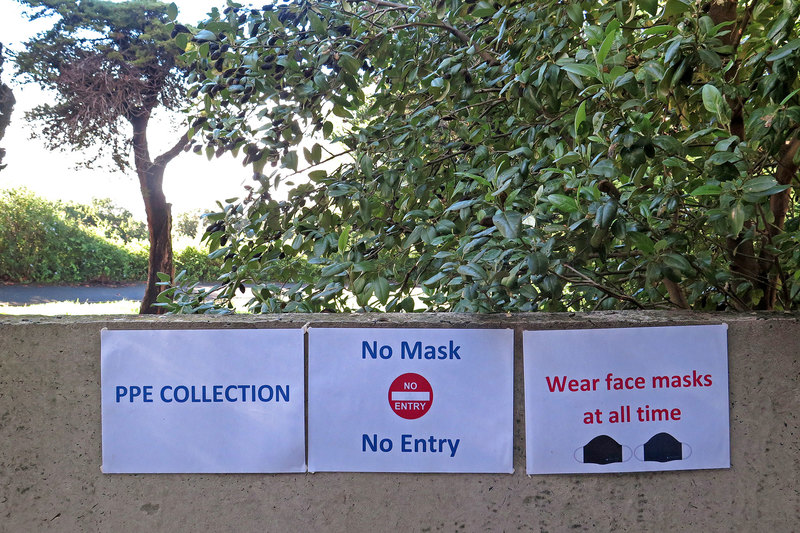Student health and wellness systems in place
15 July 2020 | Story Helen Swingler. Photo Lerato Maduna. Read time 6 min.
As the University of Cape Town (UCT) prepares for a phased return to campus of a small number of authorised students, Dr Memory Muturiki, director of the Student Wellness Service (SWS) in the Department of Student Affairs, spoke about the health and safety measures that have been put in place.
These measures have been detailed in the SWS’s COVID-19 Students Support Plan, which will be implemented and managed by the SWS COVID-19 Response Team.
In preparing for the students’ return, Muturiki said they had been guided by the university’s COVID-19 Return to UCT policy framework, a broader plan for the phased return to campus in the wake of the countrywide lockdown.
In a recent communiqué UCT chief operating officer, Dr Reno Morar, said “The framework is intended help us take individual and collective responsibility for managing the impact of COVID-19 on our working and home lives.” It also provides guidelines for UCT’s responses in the event of when staff or students contract the virus on campus.
Morar noted that it’s not business as usual on campus.
“The framework provides a way for UCT to work in the COVID-19 Cape Metropolitan ‘hotspot’ area. Staff and students are encouraged to work or study from home and only return to campus when invited to do so.”
Phased return to campus
Stringent health and wellness measures and facilities have been set up to minimise risks, said Muturiki.
In May, final-year medical students returned to campus and in June and July international students and those with disabilities returned and will be returning. August and September will see the return of those students who have been identified as vulnerable. For this phase, COVID-19 screening stations were set up in the residences and at the main clinic while students continued to receive mental health support through digital and telephonic counselling.
Once the bulk of students (66%) has returned to campus, more SWS satellite clinics and counselling sites will be operating and will follow strict appointment and distancing protocols and virtual support where possible. These sites are at:
- Ivan Toms main clinic (lower and middle campus) from 09:00 to 16:30
- Health Sciences faculty (HSF SWS service point, Falmouth Building) from 08:30 to 16:30
- Hiddingh Campus from 09:00 to 16:30
- Sports Centre and Steve Biko clinics (upper campus) from 08:30 to 16:30.
Bookings for an SWS medical officer, psychiatrist, or clinical nurse practitioner can be made online at a time that suits the student or by contacting the SWS. Face-to-face consultations will only be arranged by the clinician after a virtual consultation indicates that this is required. These appointments will take place at the SWS main clinic in Mowbray by an appointment scheduled by the practitioner. The main clinic operates with limited onsite numbers and strict physical distancing protocols; therefore no walk-ins will be allowed.
Mental health support for students by the SWS practitioners has been bolstered through the SWS Peer Counselling programme. This involves a team of four peer counsellors who are postgraduates. The programme provides intervention in the form of individual counselling. Their focus areas are: counselling, health and wellness, academic support and social/emotional adjustment.
Before and after arriving on campus
All arrangements have been documented in the SWS’s COVID-19 Students Support Plan. However, these are the important points to note.
Prior to their arrival on campus, students will receive:
- a medical vulnerability checklist
- information on self-quarantine and isolation protocols
- a copy of the students support plan
- a guide to living in residence during the pandemic
- information on mental health support and peer interventions
- the HigherHealth app for daily health monitoring.
On arrival at UCT, students will receive information on:
- quarantine nurse screening procedures
- health education and quarantine rules
- an electronic symptom monitoring tool
- discharge and post-quarantine procedures.
Muturiki said students are also strongly encouraged to take responsibility for their health. She said that students who had opted to return and have comorbidities are encouraged to consult their SWS healthcare worker or private doctor to ensure that it is safe for them to return to campus.
“Do not wait to arrive before obtaining health advice.”
“Do not wait to arrive before obtaining health advice. All of us health practitioners at SWS urge all UCT students to help reduce the transmission of COVID-19 by practising physical distancing and wearing … [personal protective equipment] PPE and [to] talk to us. SWS COVID-19 Student Line: 021 650 1271.”
Back in residence
All returning students will be screened by an SWS COVID-19 screening nurse before being allocated a room in the residence. They will also have to undertake an obligatory 14-day self-quarantine in their residence rooms, starting the day after their arrival, and are expected to abide by the quarantine rules of the residences. Students with COVID-19 symptoms will be provided medical care and treated in the designated isolation facility at All Africa House by the SWS COVID-19 Response Team.
People with the following symptoms may have COVID-19: fever or chills, cough, shortness of breath or difficulty breathing, fatigue, muscle or body aches, headache, new loss of smell or taste, sore throat, fatigue, congestion or runny nose, nausea or vomiting, and diarrhoea.
What to do if you are confirmed to have COVID-19 or have COVID-19-like symptoms? Contact the SWS triage line on 021 650 5620 during the day or the SWS COVID-19 Student Line or email sws@uct.ac.za.
 This work is licensed under a Creative Commons Attribution-NoDerivatives 4.0 International License.
This work is licensed under a Creative Commons Attribution-NoDerivatives 4.0 International License.
Please view the republishing articles page for more information.
UCT’s response to COVID-19
COVID-19 is a global pandemic that caused President Cyril Ramaphosa to declare a national disaster in South Africa on 15 March 2020 and to implement a national lockdown from 26 March 2020. UCT is taking the threat of infection in our university community extremely seriously, and this page will be updated with the latest COVID-19 information. Please note that the information on this page is subject to change depending on current lockdown regulations.
Minister of Health, Dr Joe Phaahla, has in June 2022 repealed some of South Africa’s remaining COVID-19 regulations: namely, sections 16A, 16B and 16C of the Regulations Relating to the Surveillance and the Control of Notifiable Medical Conditions under the National Health Act. We are now no longer required to wear masks or limit gatherings. Venue restrictions and checks for travellers coming into South Africa have now also been removed.
Read the latest document available on the UCT policies web page.
Campus communications
2022
UCT Community of Hope Vaccination Centre
On Wednesday, 20 July, staff from the University of Cape Town’s (UCT) Faculty of Health Sciences came together with representatives from the Western Cape Government at the UCT Community of Hope Vaccination Centre at Forest Hill Residence to acknowledge the centre’s significance in the fight against COVID-19 and to thank its staff for their contributions. The centre opened on 1 September 2021 with the aim of providing quality vaccination services to UCT staff, students and the nearby communities, as well as to create an opportunity for medical students from the Faculty of Health Sciences to gain practical public health skills. The vaccination centre ceased operations on Friday, 29 July 2022.
With the closure of the UCT Community of Hope Vaccination Centre, if you still require access to a COVID-19 vaccination site please visit the CovidComms SA website to find an alternative.
“After almost a year of operation, the University of Cape Town’s (UCT) Community of Hope Vaccination Centre, located at the Forest Hill residence complex in Mowbray, will close on Friday, 29 July 2022. I am extremely grateful and proud of all staff, students and everyone involved in this important project.”
– Vice-Chancellor Prof Mamokgethi PhakengWith the closure of the UCT Community of Hope Vaccination Centre, if you still require access to a COVID-19 vaccination site please visit the CovidComms SA website to find an alternative.
Frequently asked questions
Global Citizen Asks: Are COVID-19 Vaccines Safe & Effective?
UCT’s Institute of Infectious Disease and Molecular Medicine (IDM) collaborated with Global Citizen, speaking to trusted experts to dispel vaccine misinformation.
If you have further questions about the COVID-19 vaccine check out the FAQ produced by the Desmond Tutu Health Foundation (DTHF). The DTHF has developed a dedicated chat function where you can ask your vaccine-related questions on the bottom right hand corner of the website.
IDM YouTube channel | IDM website
“As a contact university, we look forward to readjusting our undergraduate and postgraduate programmes in 2023 as the COVID-19 regulations have been repealed.”
– Prof Harsha Kathard, Acting Deputy Vice-Chancellor: Teaching and Learning
We are continuing to monitor the situation and we will be updating the UCT community regularly – as and when there are further updates. If you are concerned or need more information, students can contact the Student Wellness Service on 021 650 5620 or 021 650 1271 (after hours), while staff can contact 021 650 5685.




















